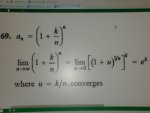You are using an out of date browser. It may not display this or other websites correctly.
You should upgrade or use an alternative browser.
You should upgrade or use an alternative browser.
A limit
- Thread starter NRS
- Start date
What is it you want to do?. Prove the limit exists?.
You can see that it does converge to e by plugging in larger and larger values of n.
But, to prove the limit exists takes a little more.
This is a very famous limit. Seen all across the math world in numerous places.
You can see that it does converge to e by plugging in larger and larger values of n.
But, to prove the limit exists takes a little more.
This is a very famous limit. Seen all across the math world in numerous places.
We can get more rigorous, but try approaching it from the differentiability of ln(x) at x=1 using the definition of a derivative.
Since the derivative of ln(x) is 1 at x=1.
\(\displaystyle \lim_{n\to 0}\frac{ln(1+n)-ln(1)}{n}=\lim_{n\to 0}\frac{ln(1+n)}{n}=\lim_{n\to 0} ln(1+n)^{\frac{1}{n}}=1\)
Taking e to both sides gives:
\(\displaystyle e=e^{\lim_{n\to 0} ln(1+n)^{\frac{1}{n}}}\)
Since e is continuous, we have:
\(\displaystyle e=\lim_{n\to 0} e^{ln(1+n)^{\frac{1}{n}}}=\lim_{n\to 0} (1+n)^{\frac{1}{n}}\)
Now, just amke the sub they mentioned to get the other forms.
We couuld also use \(\displaystyle \frac{1}{n+1}<\int_{n}^{n+1}\frac{1}{x}dx<\frac{1}{n}, \;\ n>0\)
to show that \(\displaystyle \lim_{x\to 0}\left(1+\frac{1}{n}\right)^{n}=e\)
Since the derivative of ln(x) is 1 at x=1.
\(\displaystyle \lim_{n\to 0}\frac{ln(1+n)-ln(1)}{n}=\lim_{n\to 0}\frac{ln(1+n)}{n}=\lim_{n\to 0} ln(1+n)^{\frac{1}{n}}=1\)
Taking e to both sides gives:
\(\displaystyle e=e^{\lim_{n\to 0} ln(1+n)^{\frac{1}{n}}}\)
Since e is continuous, we have:
\(\displaystyle e=\lim_{n\to 0} e^{ln(1+n)^{\frac{1}{n}}}=\lim_{n\to 0} (1+n)^{\frac{1}{n}}\)
Now, just amke the sub they mentioned to get the other forms.
We couuld also use \(\displaystyle \frac{1}{n+1}<\int_{n}^{n+1}\frac{1}{x}dx<\frac{1}{n}, \;\ n>0\)
to show that \(\displaystyle \lim_{x\to 0}\left(1+\frac{1}{n}\right)^{n}=e\)
BigGlenntheHeavy
Senior Member
- Joined
- Mar 8, 2009
- Messages
- 1,577
\(\displaystyle One \ way.\)
\(\displaystyle a_n \ = \ \lim_{n\to\infty}\bigg(1+\frac{k}{n}\bigg)^n\)
\(\displaystyle Then \ ln|a_n| \ = \ ln\bigg[\lim_{n\to\infty}\bigg(1+\frac{k}{n}\bigg)^n\bigg], \ take \ natural \ logarithm \ of \ both \ sides\)
\(\displaystyle Ergo, \ ln|a_n| \ = \ \lim_{n\to\infty}ln\bigg(1+\frac{k}{n}\bigg)^n\bigg \ = \ \lim_{n\to\infty}nln\bigg(1+\frac{k}{n}\bigg), \ a_n \ is \ continuous \ as \ n\implies\infty\)
\(\displaystyle ln|a_n| \ = \ \lim_{n\to\infty}\frac{ln\bigg(1+\frac{k}{n}\bigg)}{\frac{1}{n}}, \ gives \ indeterminate \ form \ \frac{0}{0}, \ Marqui \ time.\)
\(\displaystyle ln|a_n| \ = \ \lim_{n\to\infty}\frac{kn}{n+k}, \ Marqui \ again, \ = \ \lim_{n\to\infty}\frac{k}{1} \ = \ k\)
\(\displaystyle Now, \ since \ ln|a_n| \ = \ k \ \implies \ a_n \ = \ e^k, \ QED\)
\(\displaystyle Note: \ I \ should \ have \ preface \ this, \ however \ I'll \ put \ it \ in \ here.\)
\(\displaystyle Limit \ of \ a \ Sequence: \ Let \ f \ be \ a \ function \ of \ a \ real \ variable \ such \ that \ \lim_{x\to\infty}f(x) \ = \ L\)
\(\displaystyle If \ \{a_n\} \ is \ a \ sequence \ such \ that \ f(n) \ = \ a_n \ for \ every \ positive \ integer \ n, \ then \ \lim_{n\to\infty}a_n \ = \ L\)
\(\displaystyle a_n \ = \ \lim_{n\to\infty}\bigg(1+\frac{k}{n}\bigg)^n\)
\(\displaystyle Then \ ln|a_n| \ = \ ln\bigg[\lim_{n\to\infty}\bigg(1+\frac{k}{n}\bigg)^n\bigg], \ take \ natural \ logarithm \ of \ both \ sides\)
\(\displaystyle Ergo, \ ln|a_n| \ = \ \lim_{n\to\infty}ln\bigg(1+\frac{k}{n}\bigg)^n\bigg \ = \ \lim_{n\to\infty}nln\bigg(1+\frac{k}{n}\bigg), \ a_n \ is \ continuous \ as \ n\implies\infty\)
\(\displaystyle ln|a_n| \ = \ \lim_{n\to\infty}\frac{ln\bigg(1+\frac{k}{n}\bigg)}{\frac{1}{n}}, \ gives \ indeterminate \ form \ \frac{0}{0}, \ Marqui \ time.\)
\(\displaystyle ln|a_n| \ = \ \lim_{n\to\infty}\frac{kn}{n+k}, \ Marqui \ again, \ = \ \lim_{n\to\infty}\frac{k}{1} \ = \ k\)
\(\displaystyle Now, \ since \ ln|a_n| \ = \ k \ \implies \ a_n \ = \ e^k, \ QED\)
\(\displaystyle Note: \ I \ should \ have \ preface \ this, \ however \ I'll \ put \ it \ in \ here.\)
\(\displaystyle Limit \ of \ a \ Sequence: \ Let \ f \ be \ a \ function \ of \ a \ real \ variable \ such \ that \ \lim_{x\to\infty}f(x) \ = \ L\)
\(\displaystyle If \ \{a_n\} \ is \ a \ sequence \ such \ that \ f(n) \ = \ a_n \ for \ every \ positive \ integer \ n, \ then \ \lim_{n\to\infty}a_n \ = \ L\)
BigGlenntheHeavy
Senior Member
- Joined
- Mar 8, 2009
- Messages
- 1,577
\(\displaystyle What!!! \ You \ have \ never \ heard \ of \ "The \ Marqui \ Guillaume \ Francois \ Antoine \ de \ L'Hopital"?\)
\(\displaystyle My \ astonishment \ knows \ no \ bounds.\)
\(\displaystyle My \ astonishment \ knows \ no \ bounds.\)

